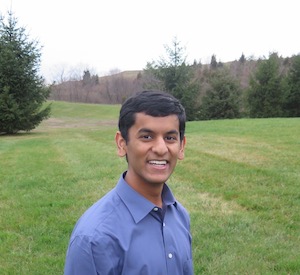
1. Which language and what level are you learning?
I am studying Telugu, the native language of Andhra Pradesh, India. I have just completed Intermediate Telugu I (the third course in the Telugu series).
2. What have you enjoyed most about the learning experience?
I love speaking Telugu it makes me feel like I’m among family back in India even if only a few times a week. In the past, I’ve tried to improve my Telugu and while I was able to somehow get my speaking ability to fluency it remained a challenge to learn reading and writing Telugu on my own. Taking Telugu at Penn has provided me with necessary structure and guidance to be able to read and write in Telugu. Being able to work in a small group setting allows everyone individualized attention from our professor, Dr. Raja Bandaru, on how to best improve. It also allowed each of us to form a great relationship in which Dr. Bandaru knows about our families, backgrounds, and interests in Telugu. In addition, to improving language skills it has helped me learn more about Andhra Pradesh culture and history from landmarks, to presidents and even famous actors. Given my roots in Andhra Pradesh, finally learning how to read and write Telugu has been a great source of pride. Also, improving my Telugu abilities has allowed closer, better communication with family.
3. How do you think that learning the language will help you in the future?
In high school, I ran a diabetic campaign in my grandfather’s rural village in which I was able to council and test many village members for diabetes. However, communication posed some difficulty. My limited vocabulary made it challenging to communicate medical information with native Telugu speakers, my accent immediately marked me as an outsider, and my inability to read and write made it difficult to read patient notes written by local doctors and create written instructions for my patients. My Telugu experience at Penn has helped me address each of these shortcomings and equipped me to better direct similar work for my next trip. In the future, I aim to become a physician-scientist and one of my goals is to pursue medical service through Doctors Without Borders. I was surprised to find that Doctors Without Borders has sites in Andhra Pradesh, but on learning this I knew I would need to be fluent in Telugu in order to best help. Serving patients in need in India would be a fulfilling experience allowing me to put my abilities to use in one of the countries I call home. On a lighter note, stronger Telugu skills will help me navigate Andhra Pradesh much better than in my last trip to India. I was traveling alone and had missed a non-stop overnight bus to my destination so I instead took one that required a separate transfer. Alone at ~5am in a bustling Andhra Pradesh bus stop without English signs made getting back to my grandparent’s home a bit more difficult than I anticipated. I can gladly say the same situation would not be a challenge now.
4. Anything that you would say to encourage other to apply for the fellowships
I was actually encouraged by my very supportive Telugu professor, Dr. Bandaru, to apply for this fellowship. I did not expect to receive the fellowship, but I kept thinking about how helpful this would be financially and academically, for future pursuits. After that I didn’t look back and quite a few days later I was ready to submit my application. In addition, just applying for this scholarship has helped me build an even stronger relationship with my Telugu professor and has helped me connect with more faculty in the South Asian Studies Department.

 South Asia Studies
South Asia Studies